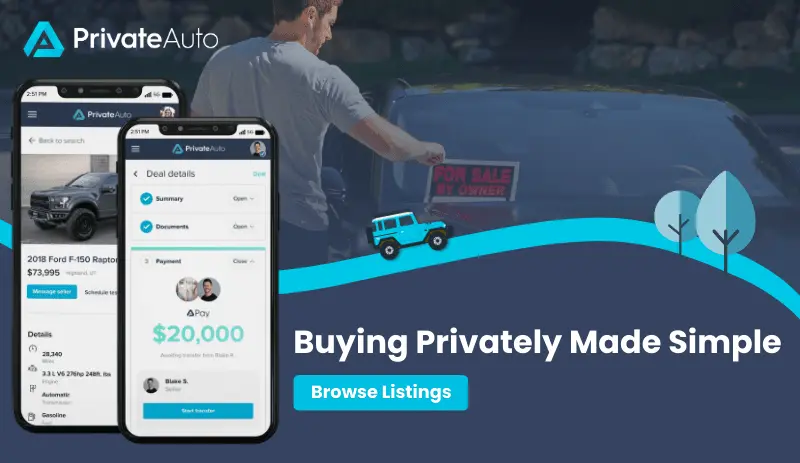Find a car
Step 1: Browse Used Vehicles Online
- Vehicle listing sites such as Autotrader.
- Social media listings.
- Auction websites such as Cars and Bids and Hemmings.
- Online classifieds
- National classifieds such as Craigslist and OfferUp.
- Local classifieds such as KSL Cars.
While these platforms help you find used cars near you, all of them lack transactional capabilities. They leave you to your own devices when it comes to closing the deal, so we like to call them “meetingplaces.”
We’re the world’s only fully self-service tech-enabled solution for every stage of the deal.
We have nothing against other listing sites. If you find your car on one of them, we’re happy for you. But we still want you to have the transactional security and convenience that our users enjoy.
That’s why we developed DealNow. It allows you to avoid fraud, sign documents, and instantly transact online.
Invite the seller to DealNow and fast-track your transaction.

Should I buy from a private seller?
Step 2: Negotiate a Price
On other sites, you’d have to message the seller and have an awkward conversation. PrivateAuto lets you make an offer with the click of a button. The seller can then accept, reject, or counteroffer.
Step 3: Vehicle Research
We have partnered with AutoCheck to provide vehicle history reports on premium listings. AutoCheck gets its data from the following sources:
- Insurance companies.
- Vehicle inspection and state inspection stations.
- Import and export companies.
- Collision repair shops.
- Service records from maintenance facilities.
- OEM manufacturers.
- Salvage auctions.
- Car dealerships and extended warranty companies.
- Auto auctions.
- State Departments of Motor Vehicles (RMVs).
- Rental and fleet companies.
Doing an AutoCheck on a vehicle uncovers valuable insights into the car’s background.
- Regular maintenance (or lack thereof).
- Title history: flood damage, salvage titles, junk titles, hail damage, storm damage, fire damage, and more.
- Emissions records.
- Odometer rollback.
- Structural or frame damage.
- Service, repair, and maintenance performed.
- Total loss and reason for the loss.
- Lien information, ownership transfers.
- Manufacturer buybacks or lemon titles.
- Collision repair history.
- City and state of previous registration, number of owners.
- Accidents and damage reports, stolen vehicles.
- Rental, taxi, lease, or government use.
- Stolen cars.
- Major repairs.
- Open recalls.
- And lots more…
Take the car for a test drive
Step 4: Take the Car for a Spin
Your privacy is compromised, and you waste a lot of time.
We keep your info secure. All communication happens through our secure messaging system. The in-app scheduler makes it easy to schedule the meetup: just select from the seller’s available times and show up at their designated location.
Do car research
Step 5: Vehicle Inspection
Here are some of the things the Lemon Squad inspector will look into. Or, if you choose to do your own inspection, look out for the following:
- Tires: examine tire treads and make sure there is sufficient tread depth. Also look for any cracks, bulges, or other tire damage. Check the spare as well.
- Interior: ensure all controls, electronics, air conditioning, and heating work properly. Look for any warning lights on the dash when the car is started. Check for water damage, stains, or tears inside.
- Body: check for obvious damage, body panel alignment, uneven gaps, mismatched paint, and signs of damage repair. Look closely for any indications of collision repair. Check for rust underneath and around various body panels. Check headlights, brake lights, and other lights.
- Fluids: check all fluid levels, including engine oil, transmission fluid, brake fluid, power steering fluid, and coolant. Look for leaks and make sure the fluids look clean and at proper levels.
- Undercarriage: inspect the car for leaks, rust, and damage. Look at brake lines, exhaust, and suspension components.
- Test drive: drive the car under different conditions to test acceleration, braking, steering, and transmission, and to feel and listen for any mechanical issues.
- Maintenance records: review the vehicle history report and check maintenance logs to understand repair and ownership history.
Handle paperwork
Step 6: Sign the Massachusetts Bill of Sale
Here are the necessary elements included in a bill of sale:
- Price of the car.
- Your full name and signature.
- The make, model, and year of the car.
- The other party’s full name and signature.
- Date of the transaction.
- A warranty disclaimer stating the car is being sold as-is.
PrivateAuto provides an official Massachusetts bill of sale as part of our standard in-app transaction process. At the appropriate stage of the transaction workflow, you and the seller will sign the Massachusetts bill of sale electronically in the PrivateAuto app. You’ll each retain a signed copy in your PrivateAuto account.
You can then feel comfortable paying for the car, knowing the seller is bound by an enforceable contract.
Pay the seller
Step 7: Pay for the Car
You can send unlimited funds to the seller with no transfer fees. Holidays, weekends, or nights—anytime. The seller will receive the money immediately. It’s convenient, secure, and most importantly, easy to use. Its instantaneous nature provides escrow-like safeguards for you to control the deal.
You can apply for a used vehicle loan directly through our app if you can’t afford to shell out the car’s full price. When your application is approved, your profile will show that you have verified funds, setting you apart from other buyers.
Our lending partner will pay the seller in full when you close the deal and send payment. You will make monthly car payments to the lender. It’s that simple.
Want to know how much your payments will be? Our handy car loan calculator will tell you.
Step 8: Sign the Official Title Certificate
Both parties need to fill out the title certificate thoroughly. The following info is required:
- Names
- Addresses
- Damage disclosure statement
- An odometer disclosure statement
- Vehicle identification number (VIN)
- Signatures
Odometer Disclosure
Inspect the odometer to verify that the seller’s entry is correct. Sellers who tamper with a car’s odometer to obtain a false reading can face serious consequences, so hopefully everything is aboveboard.
The PrivateAuto app has a field for the odometer reading so that you and the seller can validate the mileage before moving forward.
VIN Check
The PrivateAuto app has a field for the VIN, where both the buyer and seller can check it for accuracy. This helps to eliminate any errors (or the rare case of outright seller fraud).
Insure the car
Step 9: Get Auto Insurance
The PrivateAuto app makes it easy to compare rates and get auto insurance.
Transfer ownership
Step 10: Finalize with Massachusetts RMV
They will require the following:
- The vehicle title signed by the previous vehicle owner.
- Bill of sale (proof of ownership)
- Completed Registration and Title Application
- Proof of insurance.
- Payment for the title transfer fee: $75.
- Payment for the passenger vehicle registration fee: from $30 to $60.
- Payment for Massachusetts sales tax: 6.25% of the vehicle purchase price.
- Potentially other taxes and fees, depending on your city and county of residence.
- Valid driver’s license.
For more info about the title transfer process, read our Massachusetts title transfer guide.
Register the car
Get a new license plate
Massachusetts License Plates
As the buyer, you’ll apply to the RMV for new Massachusetts license plates (the cost of standard plates is included in vehicle registration).
Massachusetts Emissions Certificate
The following categories are exempt:
- New cars (for up to one year of the sale or lease date).
- Electric cars.
- Diesel cars made before 1984.
- Diesel cars older than 15 years old or made before 1997.
- Diesel cars made before 2007 with a gross car weight rating of more than 10,000 pounds.
If the car that you are buying does not meet any of these exemptions, find an approved emissions testing facility and proceed with the test.
For locations of smog check stations visit the Massachusetts RMV website.
For most cars, the fee for performing this test will be $35.

Should I Buy from a Dealership or a Private Seller?
The private-party purchase offers the following advantages:
1. You drive the deal on your terms. PrivateAuto allows you to make offers and negotiate the best deal directly with the seller.
2. Get a better price by cutting out the middleman and going straight to the source. Dealers must buy low and sell high to make a profit and keep the lights on.
3. Avoid fees. Vehicle dealers charge documentation fees that range from $50 to over $1,000.
Our transactional marketplace gives you all the tools to drive the deal on your terms, including unlimited instant payments with no transfer fees.
Massachusetts FAQ
What is a temporary tag?
Paper license plates, also known as temporary tags, are issued to car buyers as a temporary registration. They are also issued for demonstration cars in dealerships, vehicle transfers, or loaned cars. Temporary license plate tags can be used for 20 days in Massachusetts.
What kind of insurance does my newly bought used car need?
Used cars are required to have liability auto insurance at a minimum. Every insurance company will have different rates, so shop around.
The Massachusetts RMV doesn’t require you to carry evidence of your auto insurance in your car as the information is electronically available to law enforcement.
Who pays for the title fee in Massachusetts?
When applying for a Massachusetts title, the buyer is responsible for paying the title transfer fee. The buyer will also pay registration fees, sales taxes, and license plate fees.
Is buying a car privately for cash a good idea?
Buying a car in Massachusetts privately for cash can save you a lot in interest payments, but physical cash is clunky and risky.
PrivateAuto offers the immediacy of a cash payment without risk. Our PrivateAuto Pay feature is a full banking integration; when the buyer authorizes the funds to transfer through our app, money instantly moves from their PrivateAuto account into the seller—24 hours a day, 365 days a year.
How much is the car sales tax rate in Massachusetts?
Car buyers pay a 6.25% sales tax on car purchases in the state of Massachusetts. See our Massachusetts used car sales tax guide for further details.
Is there a lemon law for used cars in Massachusetts?
Massachusetts’s lemon law protects vehicles purchased from dealerships. Private sales are “as-is,” meaning that you (the buyer) assume all the risk. That’s why you should get a professional car inspection and vehicle history report.
Does Massachusetts require safety inspections?
According to the Massachusetts Registry of Motor Vehicles, annual safety inspections are mandatory for most vehicles. Cost: $35.
Helpful Resources
Helpful Links

Jacob Andra
Contributing Author
Jacob Andra is an entrepreneur, author, and technology expert living in Salt Lake City, Utah. As a stakeholder in PrivateAuto, Jacob is passionate about how our technology is bringing peer-to-peer car sales into the 21st century. When he’s not working, Jacob can be found playing pickleball, climbing mountains, or spending time with his family.
